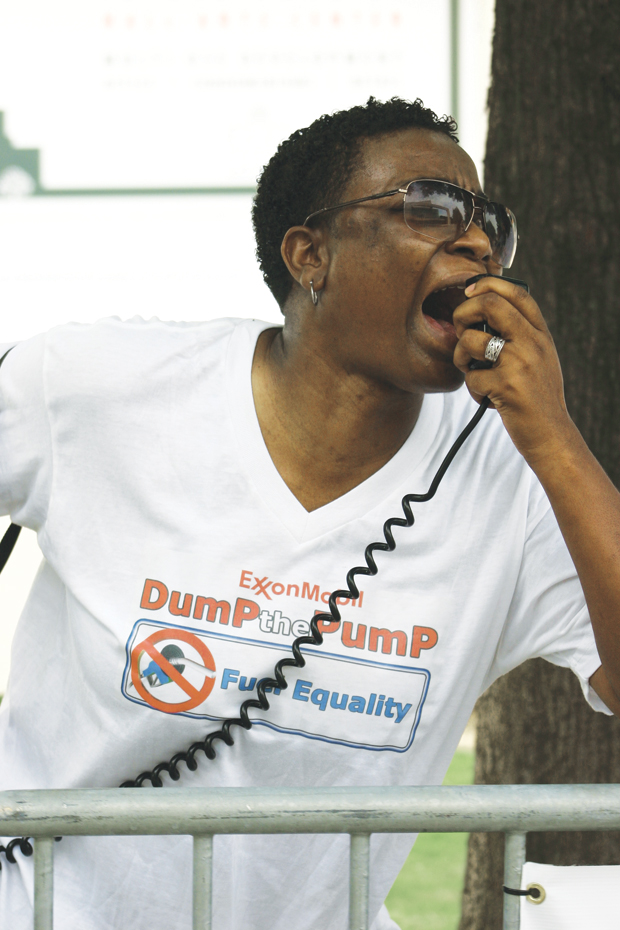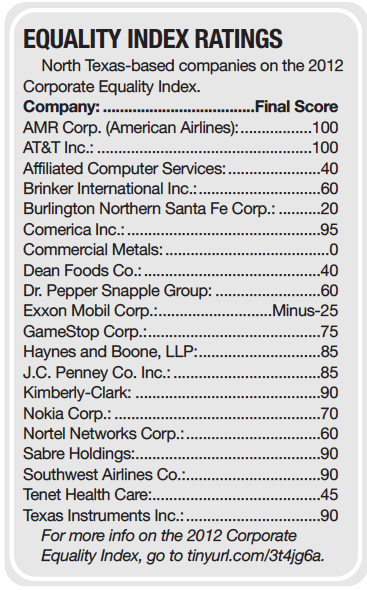Company is 1st with negative score on HRC’s Corporate Equality Index

HIGH OCTANE | Queer activist CD Kirven participates in a protest organized by GetEQUAL in 2010 outside the Meyerson Symphony Center in Dallas, where Exxon Mobil's shareholders held their annual meeting. (David Taffet/Dallas Voice)
JOHN WRIGHT | Senior Political Writer
wright@dallasvoice.com
IRVING — Exxon Mobil Corp. has again made history for its anti-gay employment practices.
The Irving-based company, which is No. 2 on the Fortune 500 and has more than 80,000 employees worldwide, last week became the first business to ever receive a negative score on the Human Rights Campaign’s annual Corporate Equality Index.
The 2012 edition of the Index, which marks the 10th anniversary of HRC’s scorecard, includes ratings for 636 major companies based on their LGBT-related employment practices.
Exxon Mobil failed to meet any of the criteria for the 2012 Index, and had points deducted for engaging in activities that undermine LGBT equality. As a result, the company received a score of minus-25 from HRC.
Before Exxon and Mobil merged in 1999, Mobil offered domestic partnership benefits and had an employment nondiscrimination policy that included sexual orientation. However, ExxonMobil did away with both the benefits and the policy after the merger, and has repeatedly resisted shareholder efforts to amend the policy to protect gay employees.
The 2012 Index marks the first year HRC has handed out negative scores, and Exxon Mobil was the only company to receive one.
“For over a decade, HRC has urged Exxon Mobil to re-evaluate its employment practices and policies regarding LGBT employees,” HRC spokesman Paul Guequierre said. “They continue to give us, and the entire LGBT community, the cold shoulder.”
William F. Holbrook, a spokesman for ExxonMobil, sent Dallas Voice a copy of the company’s “Corporate Citizenship Report,” which says it has a “zero-tolerance” policy against “discrimination based on sexual orientation and gender identity.”
However, Guequierre said the Corporate Citizenship Report isn’t an Equal Employment Opportunity statement, and lacks the legal force an EEO statement carries.
Exxon Mobil’s report also says the company offers health benefits to the partners of gay employees in countries where same-sex marriage is legal, but goes by federal law in the U.S., which only recognizes heterosexual spouses.
Holbrook declined to further discuss the company’s negative score on the CEI.
Exxon Mobil was one of three companies to receive the 25-point deduction for undermining LGBT equality on the 2012 Index. The other two were New York-based Verizon Communications Inc. and Milwaukee-based Foley & Lardner LLP.
Deena Fidas, director of HRC’s Workplace Project, said Verizon was penalized for resisting a shareholder resolution to add gender identity to the company’s employment nondiscrimination policy; while Foley & Lardner was docked for representing the National Organization for Marriage in campaigns against marriage equality in the District of Columbia and Minnesota.
Verizon received an overall score of 20, while Foley & Lardner got a 60.
“It is not a designation that we take lightly,” Fidas said of the 25-point deduction for undermining LGBT equality. “These businesses did nothing to rectify these particular situations.”
 On a more positive note, Fort Worth-based AMR Corp. (American Airlines) is one of only nine companies that have received perfect scores every year since the Index began in 2002, Fidas said. The others are Aetna Inc., Alcatel-Lucent, Apple Inc., Eastman Kodak Co., JPMorgan Chase & Co., Nike Inc., Replacements Ltd. and Xerox Corp.
On a more positive note, Fort Worth-based AMR Corp. (American Airlines) is one of only nine companies that have received perfect scores every year since the Index began in 2002, Fidas said. The others are Aetna Inc., Alcatel-Lucent, Apple Inc., Eastman Kodak Co., JPMorgan Chase & Co., Nike Inc., Replacements Ltd. and Xerox Corp.
Those nine employers all managed to maintain their scores of 100 on the 2012 CEI despite new, more stringent criteria — most notably a requirement to offer comprehensive transgender health benefits, including coverage for gender reassignment surgery.
Lauri Curtis, vice president for diversity at American Airlines, said adding comprehensive trans health benefits was “the right thing to do for our business.”
“We don’t look at it as how difficult it was,” Curtis said. “The bottom line is that we have a very diverse population, both our employees as well as our customers, and that’s really what we true ourselves to. That’s our driving guidepost as it relates to our diversity efforts.
“At the end of the day it’s all about equality and respect for everyone,” she added. “I think it just underscores that this is serious stuff to us, because it’s just part of who we are. It’s been part of who we are for a long time.”
American Airlines and AT&T Inc. were the only North Texas-based companies that satisfied all of the new criteria and received perfect scores on the 2012 CEI. That’s down from nine local companies that received HRC’s top rating on the 2011 index.
Nationally, 190 companies received perfect scores this year, down from 337 last year. But Fidas said comparing this year’s scores to last year’s amounts to apples and oranges. In addition to trans health coverage, HRC added criteria in 2012 related to “soft” partner benefits, organizational competency on LGBT issues, and public support for equality.
“It’s a new standard,” Fidas said. “We raised the bar in these four significant areas, and some businesses are just going to take a little more time to get there. We don’t see that as a drop or a lack of commitment.”
In fact, Fidas said, this year’s Index shows remarkable progress as employers strive to meet the new criteria. For example, two years ago, only 49 employers offered comprehensive trans health benefits, but since then the number has jumped to 207.
Representatives from North Texas-based companies that lost their perfect scores on this year’s CEI said they’re disappointed but committed to working toward re-establishing them.
“Anytime that you were on a list and then you’re not a on a list, it does cause some angst,” said Steve Lyle, chief diversity officer for Dallas-based Texas Instruments, which received a 90 on the 2012 Index after four consecutive years of perfect scores. “We don’t want that segment or our employee population to feel disenfranchised because TI’s no longer on this list, or feel like we care less today than we did last week.”
That’s why the company sent emails to LGBT employees in advance of the Index’s release explaining the reason for the lower score: The company’s insurance provider, Blue Cross Blue Shield, doesn’t consider gender reassignment surgery to be a medically necessary procedure.
Texas Instruments could have overridden Blue Cross’ decision at a minimal cost, Lyle said. However, that would have been unfair to employees who want coverage for other procedures that aren’t considered medically necessary, including growth hormones for children and in vitro fertilization.
Lyle added that TI is interested in working with HRC and other employers to convince insurance providers that gender reassignment surgery — historically regarded as cosmetic — should instead be deemed medically necessary.
“We’re in the business of making electronics, not in determining medical necessity, but we do want to influence the conversation, because it aligns with our values,” said Lyle, who’s openly gay. “We want to be able to offer benefits to our employees that are necessary for them, but we also want to have internal equity of those benefits.”
Plano-based J.C. Penney Company Inc. also lost points for failing to offer comprehensive trans health benefits, and saw its score drop from a 100 to an 85. Daphne Avila, a spokesman for J.C. Penney, said in an email this week that the company will “continue to explore cost-effective options for improving associate benefits.”
“Given our record of achieving a perfect score three out of the past four years, our current ranking is not where we would like it to be,” Avila wrote. “While the new guidelines present opportunities for advancement across all industries, our score – albeit not poor – does not accurately reflect our overall commitment to inclusion and diversity. … While we are unable to guarantee our future standings, please know that we are already evaluating the 2013 HRC criteria and are looking for opportunities to raise the bar.”
Representatives from Grapevine-based GameStop, which saw its score drop from 100 last year to 75 this year; and Dallas-based Brinker International, which saw its score drop from 100 to 60, didn’t respond to requests for comment this week.
This article appeared in the Dallas Voice print edition December 16, 2011.













I need to know the specific criteria and points used to produce the index’s score and the process used to create it before it has much credibilty to me. Without this information in the article the Good Housekeeping Seal of Approval has more credibilty.
@Reader: Needless to say you can read all about the criteria in the Corporate Equality Index. https://www.hrc.org/resources/entry/corporate-equality-index-2011
Something that needs to be produced is a customer satisfaction survey. AA service has gone to SHIT! The flight attendants are old, rude, overpaid, and could careless about the passengers! They have taken on the motto of sit down buckle up and shut the fuck up, and don’t brother me, I have magazines to read! There are far younger more eager people out there that would love to have their jobs. You submit comment cards, but you think AA cares no. They do not want to deal with the unions! No wonder they have filed for Chapter 11! I am sure AA employees will come back and reply about how they are so mistreated and are underpaid. Well I am going to beat you to the punch! Have many friends that work there as flight attendants and I know what they are paid, and living very nice! So, start showing some respect to the passengers, and you just may get some respect back!